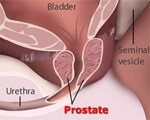Men who regularly get moderate exercise may have a lower risk of developing prostate cancer -- including aggressive, fast-growing tumors.

A number of studies have looked at the relationship between exercise and prostate cancer, and while most have pointed to a protective effect, about one-third have found no association. To further study the association, researchers identified 190 men who underwent biopsies for possible prostate cancer.
It was found that among the 111 sedentary men in the study, half were diagnosed with cancer after biopsy. That compared with 27 percent of those men who got the equivalent of three to six hours of walking each week. And among men diagnosed with prostate cancer, 51 percent of sedentary patients had more-aggressive cancer, versus 22 percent of those who had been mildly active - getting the equivalent of one to three hours of moderate walking per week.
Exercise itself remained linked to a lower risk of prostate cancer after the researchers accounted for a number of other factors, like age, weight and race. The findings do not prove that exercise helps prevent prostate cancer. But they could offer men yet more incentive to get active.
The findings could be attributed to the fact that exercise has been shown to lower blood levels of testosterone and other hormones that may stimulate prostate tumor growth. Exercise is also believed to stimulate the immune system and the body's natural antioxidant mechanisms, both of which may help prevent the development of prostate cancer.
DoctorNDTV is the one stop site for all your health needs providing the most credible health information, health news and tips with expert advice on healthy living, diet plans, informative videos etc. You can get the most relevant and accurate info you need about health problems like diabetes, cancer, pregnancy, HIV and AIDS, weight loss and many other lifestyle diseases. We have a panel of over 350 experts who help us develop content by giving their valuable inputs and bringing to us the latest in the world of healthcare.












